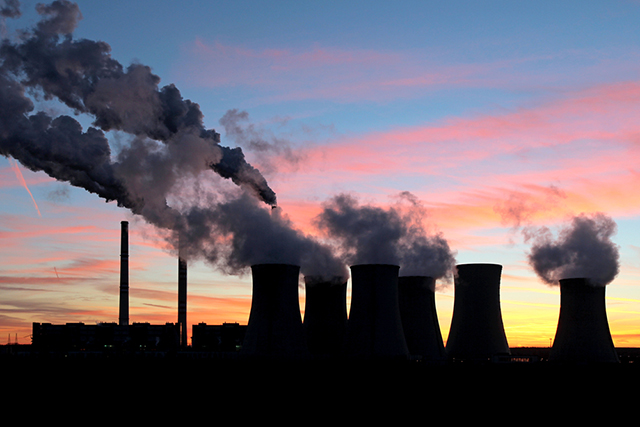
This week, the White House announced the “American Business Act on Climate Change” pledge, which contains pledges to reduce carbon emissions from 13 of the country’s largest corporations. Together their pledges amount to “$140 billion in new low-carbon investment” and “1,600 megawatts of new renewable energy” projects.
The July 27 announcement of these pledges has been widely heralded as a game-changing, important move by major industry players in the fight to reduce the harmful effects of anthropogenic climate change. ThinkProgress described the move as “meant to demonstrate industry support for strong carbon reduction goals.”
This certainly rings true for some on the list, though the growth-oriented model that they all share suggests that none will actually do all that is necessary to roll back the negative effects of climate change.
Nevertheless, industry policies do make some difference. Google has a demonstrated track record of increasing its reliance on renewable energy and has participated in lobbying for investment in it. Google has also lobbied for easier access to renewable energy in parts of the United States, where it is currently restricted by pro-fossil fuel interests. And General Motors was awarded a perfect score in 2014 by the Climate Disclosure Project for its efforts to reduce greenhouse gas emissions and foster a sustainable business model, which suggests that its stated goals for 2020 are already in process.
Microsoft’s set of “commitments” is so vague as to not even include any target dates.
However, for some other companies on the list, the gesture, when considered in the context of overall business operations and carbon impact, seems mostly symbolic. Bank of America, though it vowed in 2014 to cut investments in coal in response to the fossil fuels divestment movement, voted down a proposal that would have required it to make transparent the carbon impact of its other substantial investments in fossil fuel initiatives. On this issue, Ceres, a nonprofit dedicated to fostering a sustainable economy, wrote, “a bank’s financed emissions typically dwarf its other climate impacts.” This reality raises the question of how significant Bank of America’s pledge to fund up to $125 billion in sustainable business initiatives by 2025 really is.
The same critique can be made of Berkshire Hathaway Energy (primarily owned by Berkshire Hathaway) and Goldman Sachs, which have larger portfolios of investments that do not signal “strong carbon reduction goals.”
PepsiCo, Coca-Cola and Cargill are framed as climate change leaders for signing on to the act, despite the fact that their manufacturing operations and sourcing policies are well-known to be massively destructive to the earth’s environment in terms of resource extraction, soil and forest depletion and pollution – all of which fuel anthropogenic climate change.
Alcoa, one of the world’s largest aluminum manufacturers, has directed its pledge of reducing greenhouse gas emissions by 50 percent by 2025 (over 2005 numbers) at its US facilities, although a substantial portion of its extractive and smelting operations – and thus carbon emissions – happen overseas.
Meanwhile, Alcoa remains a member of the anti-renewable energy coalition, the American Legislative Exchange Council, known as ALEC, as does UPS, which raises questions about the veracity of the pledges made by both.
Microsoft’s set of “commitments” is so vague as to not even include any target dates, and any real evidence that it is in fact moving to power its data centers with renewable energy is lacking. As Greenpeace observed in its 2015 “Clicking Clean” report, “Microsoft’s strategy for reaching its ‘carbon neutral’ commitment remains primarily reliant on the purchase of unbundled renewable energy credits and carbon offsets, which have little if any impact on the energy powering its data centers.”
And finally, there’s Apple and Walmart, both of which continue to direct attention to energy efficiency and carbon reduction at their US operations, despite the fact that the vast majority of their greenhouse gas emissions impact on the world stems from the manufacture of the products they sell. In both cases, manufacture of goods mostly takes place in China, where production is powered by dirty coal. And in the case of Apple, the production of those goods is increasing in carbon intensity.
So while it’s certainly a good thing that Apple will add 280 megawatts of renewable energy to power its retail, corporate and data facilities in the United States and China by 2016, these initiatives represent just 1 percent of the company’s 2014 carbon footprint. If Apple’s leaders were truly serious about reducing the company’s impact on climate change, they would invest in renewable energy sources for production facilities. The rest is really just child’s play. Especially considering that the total industry pledge of 1,600 megawatts of renewable energy would power just three medium-sized factories.
Join us in defending the truth before it’s too late
The future of independent journalism is uncertain, and the consequences of losing it are too grave to ignore. To ensure Truthout remains safe, strong, and free, we need to raise $43,000 in the next 6 days. Every dollar raised goes directly toward the costs of producing news you can trust.
Please give what you can — because by supporting us with a tax-deductible donation, you’re not just preserving a source of news, you’re helping to safeguard what’s left of our democracy.